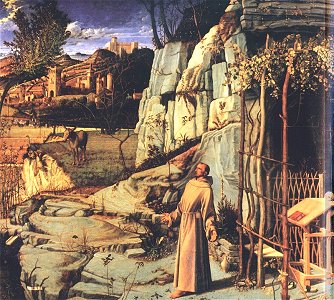
| LORD, make us instruments of Your peace. Where there is hatred, let us sow love;
Where there is injury, pardon;
Where there is discord, union;
Where there is doubt, faith;
Where there is despair, hope;
Where there is darkness, light;
Where there is sadness, joy. O Divine Master, grant that we may not seek to much to be consoled as to console;
to be understood as to understand;
to be loved as to love. For it is in giving that we receive; it is in pardonning that we are pardoned;
and it is in dying that we are born to eternal life. -- Attributed to John Bernardone ("Francis of Assisi"), 13th Century |
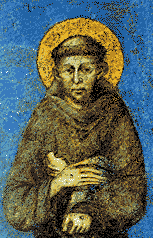 Francis of Assisi
Francis of Assisi
Most people know Francis as a middle-ages ascetic who loved animals. The complete story is even more interesting.
He was born John Bernardone, the son of successful merchant Peter Bernardone. Peter made his living travelling to and from France, and importing their fine fabrics. The early sources say that Peter nicknamed his son "Francis" ("Frenchy"). Or perhaps John acquired the name because as a teen and adult, he liked to play the French instrument -- an early form of the guitar, and the subject of some ecclesiastical disapproval. ("These kids nowadays and their music!")
We read that in his youth, Francis used to organize parties for the upper-class kids. Whether he had any romantic involvements will never be known. An early liturgy honoring him as a saint stated that he "surpassed all the other young people in debauchery". A few years later, it was changed to say that "he was himself restrained by God's grace."
Two neighboring towns had a war and Francis was a P.O.W. for a year. This was the beginning of a new interest in religion. There are stories of mystical experiences, vigils, and finally a vision of a talking crucifix in an abandoned chapel: "Francis, rebuild my church." The young Francis took this literally, and started doing repairs on dilapidated, out-of-use chapels and raising money for materials by doing odd jobs and asking for donations.
Exactly what happened between Francis and his father will never be known, but Francis admitted stealing some cloth and selling it for building funds. During the hearing, Francis told his father he could have back everything he'd ever given him. He stripped naked, and said that he was a religious ascetic. The bishop, who was holding the hearing, gave him something to wear, and Francis went to live on his own. His father never accepted reconciliation, although his mother never broke with him.
Francis was mugged for the first time within a few hours. He worked for a while as kitchen help for the Benedictines, but ended up hiring himself as a day-laborer. On Saint Matthias's day, Francis heard the gospel lession, about being mendicant preachers of the Good News of Christ. He felt called to this, and began preaching as the way he was really supposed to "rebuild the church". Although he preached, he continued to support himself by working, and did not pass a collection during his sessions. He never became a priest, though eventually he was made deacon.
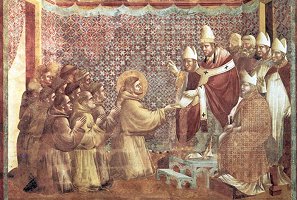 Francis acquired a number of like-minded friends, and they obtained recognition from the Bishop of Rome (the Pope) as an order, outside the jurisdiction of the local authorities. Francis probably welcomed this, as a help to keep his movement out of local politics. Rome was glad to have these people who were dedicated to living the Gospel and to Bible preaching, as its special associates.
Francis acquired a number of like-minded friends, and they obtained recognition from the Bishop of Rome (the Pope) as an order, outside the jurisdiction of the local authorities. Francis probably welcomed this, as a help to keep his movement out of local politics. Rome was glad to have these people who were dedicated to living the Gospel and to Bible preaching, as its special associates.We might think that the savvy leaders of Rome, foreseeing the Protestant Reformation, intentionally promoted a crypto-Protestant like Francis who professed loyalty to the established church institutions. Francis talked a great deal about his reverence for ordained people, his fidelity to the medieval church, and so forth. His actions show that this was selective. He established the order of the Poor Clares himself, and dedicated its first members -- a function which by law was the bishop's prerogative. He read and quoted the Bible and preached boldly and powerfully from it. He emphasized personal repentance, the personal relationship with Jesus as Lord, and gratitude for the blessings of life and the sacrifice of Christ by which our salvation is obtained.
Everybody knows the stories about birds seeming to listen as Francis told them about their Creator, and how they should be grateful and happy. There are all manner of anecdotes about this curious, engaging hermit-preacher. At one point, the young Francis bought a lamb which was being taken to slaughter, and raised it as a pet. It grew up. People think the same things in all eras, and one early biographer mentions his being questioned about this by the bishop. Also mentioned is an incident in which Francis overcame sensual temptation by stripping naked and making eight snowmen. The first represented himself, able to do what he liked best -- preach, pray, and live simply. The second represented the wife he would need if he could not be contented, and he reminded himself of how much more complicated his life would become. After four children, a school teacher, and a baby sitter, and the host of responsibilities, he was able to find inner peace.
 Within a decade, Francis had so many imitators that they organized at the "Chapter of Mats". Francis proved incapable of adminstering a movement, and there were soon divisions over how strict the asceticism of the movement should be. Seeking a new direction, Francis stowed away on a ship, and traveled to North Africa to try to stop the crusades. He crossed to Moslem territory got himself arrested on the presumption of being a spy. Of course the Moslems knew who he was, and found him fascinating. The Sultan in particular professed amazement at meeting a Christian who was also a person of peace and goodwill. Francis offered to be set on fire as a no-lose test -- if he lived, it would be proof of the merits of the Christian religion but if he died, it would be because of his sins. Instead, the Sultan let him tour the historical sites in the Holy Land, which were off-limits to Christians. To this day, many of these sites are maintained by Franciscans. The only gift Francis accepted from his Moslem friends was a prayer horn, which he sounded at the beginning of his sermons for the rest of his career. He gave specific orders that while Moslem areas were targets for evangelization, no Franciscan had any reason ever to speak ill of Mohammed or the Koran.
Within a decade, Francis had so many imitators that they organized at the "Chapter of Mats". Francis proved incapable of adminstering a movement, and there were soon divisions over how strict the asceticism of the movement should be. Seeking a new direction, Francis stowed away on a ship, and traveled to North Africa to try to stop the crusades. He crossed to Moslem territory got himself arrested on the presumption of being a spy. Of course the Moslems knew who he was, and found him fascinating. The Sultan in particular professed amazement at meeting a Christian who was also a person of peace and goodwill. Francis offered to be set on fire as a no-lose test -- if he lived, it would be proof of the merits of the Christian religion but if he died, it would be because of his sins. Instead, the Sultan let him tour the historical sites in the Holy Land, which were off-limits to Christians. To this day, many of these sites are maintained by Franciscans. The only gift Francis accepted from his Moslem friends was a prayer horn, which he sounded at the beginning of his sermons for the rest of his career. He gave specific orders that while Moslem areas were targets for evangelization, no Franciscan had any reason ever to speak ill of Mohammed or the Koran. 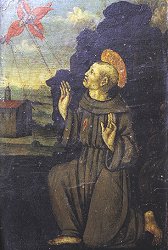 Returning home, Francis remained in public life. He negotiated one important peace settlement, and completed his "Song of Brother Sun", which he urged his emulators to play on the still-controversial guitar. On retreat, he had a vision of a crucified seraph (a theological impossibility, as he well knew), which flashed bolts of light which left him with wounds mirroring Christ's. He tried to hide these from his associates, but they reported seeing and feeling blackened, painful areas on each hand and foot and on one side of the chest. He was the first known Christian, except perhaps Paul, to bear the supposed "stigmata".
Returning home, Francis remained in public life. He negotiated one important peace settlement, and completed his "Song of Brother Sun", which he urged his emulators to play on the still-controversial guitar. On retreat, he had a vision of a crucified seraph (a theological impossibility, as he well knew), which flashed bolts of light which left him with wounds mirroring Christ's. He tried to hide these from his associates, but they reported seeing and feeling blackened, painful areas on each hand and foot and on one side of the chest. He was the first known Christian, except perhaps Paul, to bear the supposed "stigmata".
Francis died a few years after returning from the Near East. His symptoms suggest schstosomiasis, which as a visitor to Egypt he would have been a serious risk. He also suffered from an eye problem, probably trachoma, which was also endemic in Egypt. His request to be buried beneath the town gallows was honored, but the gallows was torn down and a basilica erected. Infighting in the order has blackwashed the name of Brother Elias, who did the building. The body was so well-hidden from relic-seekers that it was not found until the 1800's. Although he was not a vegetarian, forensic osteologists determined that Francis suffered from osteomalacia, from his ascetic diet.
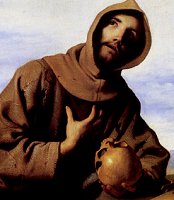 Why remember Francis? He was a powerful, authentic Bible preacher in an era when this was rare. His message of love and gratitude goes beyond all Christian sectarianism, so that his "Song of Brother Sun" was chosen at one major interfaith gathering as the single song that everyone present -- Christian and non-Christian -- could sing together.
Why remember Francis? He was a powerful, authentic Bible preacher in an era when this was rare. His message of love and gratitude goes beyond all Christian sectarianism, so that his "Song of Brother Sun" was chosen at one major interfaith gathering as the single song that everyone present -- Christian and non-Christian -- could sing together.
And Francis is special in another way, not really separate. Francis's era saw feudalism replaced by capitalism, the profit motive, and a wealthier and healthier society. Not everybody can or should be a holy hermit. Francis gave a resounding "No!" to the preoccupation with getting rich, but without advancing any political agenda or urging people to license or irresponsibility. Lenin, dying, is said to have spoken of Francis, and saying that his was the right way after all. In our day, when we see Francis's picture in a birdbath, let's remember both the goodness of nature and creation, and how much better life is when we let go of our focus on wealth and status, and seek first the Kingdom of God.
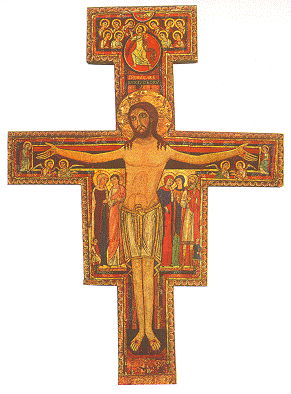 | "The Divine Praises"
Francis of Assisi You are holy, Lord, the only God,
and Your deeds are wonderful.
You are strong.
You are great.
You are the Most High.
You are Almighty.
You, Holy Father are King of heaven and earth.
You are Three and One, Lord God, all Good.
You are Good, all Good, supreme Good,
Lord God, living and true.
You are love. You are wisdom.
You are humility. You are endurance.
You are rest. You are peace.
You are joy and gladness.
You are justice and moderation.
You are all our riches, and You suffice for us.
You are beauty.
You are gentleness.
You are our protector.
You are our guardian and defender.
You are our courage. You are our haven and our hope.
You are our faith, our great consolation.
You are our eternal life, Great and Wonderful Lord,
God Almighty, Merciful Saviour.
|
 A VIda Franciscana..
A VIda Franciscana..






















 Why remember Francis? He was a powerful, authentic Bible preacher in an era when this was rare. His message of love and gratitude goes beyond all Christian sectarianism, so that his "Song of Brother Sun" was chosen at one major interfaith gathering as the single song that everyone present -- Christian and non-Christian -- could sing together.
Why remember Francis? He was a powerful, authentic Bible preacher in an era when this was rare. His message of love and gratitude goes beyond all Christian sectarianism, so that his "Song of Brother Sun" was chosen at one major interfaith gathering as the single song that everyone present -- Christian and non-Christian -- could sing together. 
 Apóstolo de Cristo nascido em Nazaré, primo de Jesus e irmão de Judas Tadeu, também conhecido como o Desconhecido, que o evangelista Marcos chamou de o Menor para distinguí-lo de Tiago, irmão de João, entra em cena como bispo de Jerusalém, após o martírio de Tiago, o Maior (42), e após o afastamento de Pedro de Jerusalém. Agricultor, era filho de Alfeu, um irmão de São José, e de Maria Cleófas, prima-irmã de Maria Santíssima. Tornou-se um membro altamente respeitado da recém-nascida comunidade cristã em Jerusalém e é considerado o primeiro bispo de Jerusalém, cuja igreja dirigiu por cerca de vinte anos (42-62). Também chamado de o Justo pelos primeiros cristãos devido à sua grande piedade, sua imagem austera sobressai pela Epístola que dirigiu, como uma encíclica, a todas as comunidades cristãs. Pertencem a ele as tradições Judáico-Cristã preservadas no Evangelho dos Ebionitas, Evangelho dos Hebreus, Elevações de Tiago, na última Epístola Canônica de Tiago e possivelmente em outras obras associadas a seu nome como o Protevangelium, embora haja dúvidas sobre isso. A sua epístola (carta dos Apóstolos e comunidades cristãs primitivas) apresenta autênticos ensinamentos preservados na tradição apostólica oral, com fortes expressões de admoestações e cujo texto continua atualíssimo. Foi um observador da normas judaicas, defendendo que estas normas deveriam fazer parte do Cristianismo. Com isso, tornou-se adversário de Paulo de Tarso nesta questão, mas também foi conciliador e um pregador fervoroso do ensino de Jesus. Seus ensinamentos deram origem à sucessão apostólica Cristã-Judáica de Jerusalém, que contribuiu para a sucessão Síria, Jacobita, Armênia e Georgiana. A sua Liturgia, que se assemelha àquela do Bispo Cyril de Jerusalém (386), parece ser um desenvolvimento de 5 séculos através das tradições apostólicas de Jerusalém e é ainda usada por certos ramos da ortodoxia. Durante a perseguição dos cristãos na Palestina, segundo o historiadores Hegesipo, Clemente de Alexandria e o hebreu Flavius Josephus, o apóstolo teria sido condenado por se recusar a denunciar os cristãos, sendo apedrejado até a morte, por ordem do corpo religioso do Templo, dirigido pelo sumo sacerdote Ananias. Tem sua festa votiva em primeiro de maio.
Apóstolo de Cristo nascido em Nazaré, primo de Jesus e irmão de Judas Tadeu, também conhecido como o Desconhecido, que o evangelista Marcos chamou de o Menor para distinguí-lo de Tiago, irmão de João, entra em cena como bispo de Jerusalém, após o martírio de Tiago, o Maior (42), e após o afastamento de Pedro de Jerusalém. Agricultor, era filho de Alfeu, um irmão de São José, e de Maria Cleófas, prima-irmã de Maria Santíssima. Tornou-se um membro altamente respeitado da recém-nascida comunidade cristã em Jerusalém e é considerado o primeiro bispo de Jerusalém, cuja igreja dirigiu por cerca de vinte anos (42-62). Também chamado de o Justo pelos primeiros cristãos devido à sua grande piedade, sua imagem austera sobressai pela Epístola que dirigiu, como uma encíclica, a todas as comunidades cristãs. Pertencem a ele as tradições Judáico-Cristã preservadas no Evangelho dos Ebionitas, Evangelho dos Hebreus, Elevações de Tiago, na última Epístola Canônica de Tiago e possivelmente em outras obras associadas a seu nome como o Protevangelium, embora haja dúvidas sobre isso. A sua epístola (carta dos Apóstolos e comunidades cristãs primitivas) apresenta autênticos ensinamentos preservados na tradição apostólica oral, com fortes expressões de admoestações e cujo texto continua atualíssimo. Foi um observador da normas judaicas, defendendo que estas normas deveriam fazer parte do Cristianismo. Com isso, tornou-se adversário de Paulo de Tarso nesta questão, mas também foi conciliador e um pregador fervoroso do ensino de Jesus. Seus ensinamentos deram origem à sucessão apostólica Cristã-Judáica de Jerusalém, que contribuiu para a sucessão Síria, Jacobita, Armênia e Georgiana. A sua Liturgia, que se assemelha àquela do Bispo Cyril de Jerusalém (386), parece ser um desenvolvimento de 5 séculos através das tradições apostólicas de Jerusalém e é ainda usada por certos ramos da ortodoxia. Durante a perseguição dos cristãos na Palestina, segundo o historiadores Hegesipo, Clemente de Alexandria e o hebreu Flavius Josephus, o apóstolo teria sido condenado por se recusar a denunciar os cristãos, sendo apedrejado até a morte, por ordem do corpo religioso do Templo, dirigido pelo sumo sacerdote Ananias. Tem sua festa votiva em primeiro de maio.
